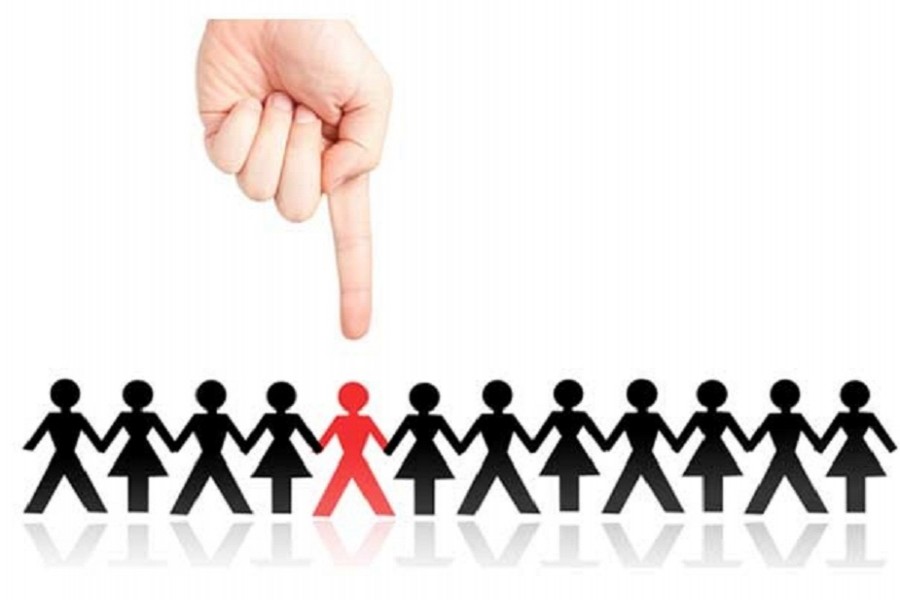The government has tabled a new law to stamp out discrimination in all spheres of society and guarantee equal rights for all citizens, regardless of their gender, religion or ethnicity.
The 'Anti-discrimination Act Bill-2022' was presented in parliament by Law Minister Anisul Huq on Tuesday, reports bdnews24.com.
The provisions of the proposed legislation have been drafted in line with articles 27, 28 and 29 of the Constitution.
The bill will now be scrutinised by the parliamentary standing committee on the Ministry of Law, Justice and Parliamentary Affairs over the next 30 days.
BNP lawmaker Harunur Rashid had opposed the placement of the bill but his objections were shot down by the other members of the house.
The proposed law provides for the formation of a monitoring committee, headed by the law minister, to oversee its implementation.
The committee will also consist of the president of the Bangladesh Employers Federation, representatives of religious, human rights and social organisations along with members of ethnic minority groups and the Dalit community.
A joint secretary from the Legislative and Parliamentary Affairs Division will serve as the committee's member secretary.
The law also empowers the government to form local and national bodies to combat discrimination.
WHAT ARE DISCRIMINATORY ACTS?
The proposed legislation bars individuals from discriminating against others on the basis of religion, caste, race, language, age, gender, and physical or mental disabilities. It also offers protection to people belonging to religious and ethnic minority groups as well as the transgender community.
The following acts will be deemed as discriminatory under the proposed legal framework:
#Preventing or restricting individuals or groups from access to a public place.
#Depriving any individual of service at government, quasi-government, autonomous and private offices
#Preventing any individual from producing, selling and marketing legal products and services, or obstructing others from availing such products or services.
#Denying children, who fail to provide the names of their parents, admission to an educational institution without valid reasons, or imposing rules that put certain children at a disadvantage or lead to physical and mental abuse or expulsion from educational institutions.
#Taking children away from their families and placing them in the care of another person, group or organisation due to them suffering from physical disabilities or them being transgender.
#Banning any person or group from running a legal business or taking a legitimate job.
#Preventing any person or community from organising, participating in or celebrating any festival, or preventing them from entering their respective places of worship, participating in prayers, or preventing the last rites of any person from any religious community from being performed.
#Disparity in the process of appointment, promotion, transfer, salary, allowances and other benefits in government, semi-government, autonomous, or private organisations and the imposition of rules or restrictions that compel an individual to resign or leads to their dismissal.
#Refusing to rent out a house to any person or group or imposing onerous rent conditions.
#Evicting any person or members of a community from their residence, locality, or preventing them from entering their residences.
#Socially ostracising any person or a group through the village arbitration process or harassment
#Discriminatory treatment of a divorcee, widow or any woman due to their marital status
#Preventing any person or community from practising their religious rituals or forcing them to accept a different religion or leave their own religion
#Preventing any person or group from legally acquiring and transferring property and depriving them of property or inheritance rights
#Preventing people from taking part in local, national, political, social and cultural programmes
HOW TO FILE A COMPLAINT
Any person can file a complaint about any discriminatory acts that they have been subjected to or on behalf of others with their local district committee. The district committee must then launch a probe into the matter within 30 days.
If the district committee fails to adequately deal with an issue, a plaintiff will be able to file a complaint with the divisional committee, which will be under a duty to resolve the issue in 30 days.
However, if the divisional committee, too, fails to provide redress, the plaintiff can take the matter up with the national committee, which will have 45 days to address the concerns.
The draft law allows a plaintiff to go to the courts if the national committee fails to deal with the complaint.
The court will have 90 days to dispose of the case, with a provision for a further 15 days. It can then issue an order to bar the discriminatory act or impose a fine on the accused.


